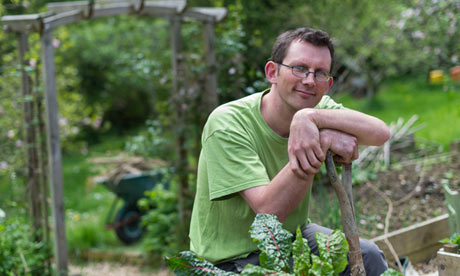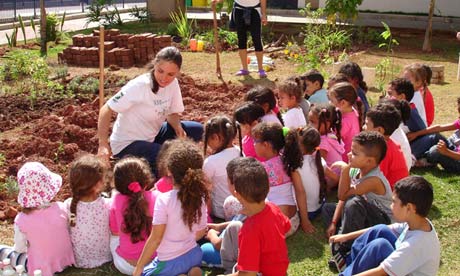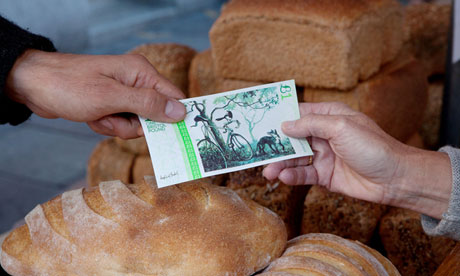Chief Executive Officers of local authorities certainly seem interested:
Local, self-sufficient, optimistic: are Transition Towns the way forward?
Locally grown food,
community-owned power stations, local currencies … can small-scale actions make
a difference? Yes, according to the Transition network – in fact, it's our only
hope
John-Paul Flintoff The
Guardian, Saturday 15 June 2013

'There is no cavalry
coming to the rescue' … Rob Hopkins, co-founder of the Transition network,
which promotes local, self-sufficient economic development. Photograph: Jim
Wileman/PA
Late last year, Rob Hopkins went to a conference. Most
of the delegates were chief executive officers at local authorities, but it was
not a public event. Speaking in confidence, three-quarters of these officials
admitted that – despite what they say publicly – they could not foresee a
return to growth in the near future.
"One said: 'If we
ever get out of this recession, nothing will be as it was in the
past,'" Hopkins recalls. "Another said: 'Every generation has had
things better than its parents. Not any more.' But the one that stunned me
said: 'No civilisation has lasted for ever. There is a very real chance of
collapse.'"
Shocking stuff –
shocking enough to leave many people feeling hopeless. And Hopkins has heard
MPs and others in positions of power confess to similar fears in private. But
the co-founder of the Transition Town movement is determined to
offer courage and inspiration, and to do that he has published a short book, The Power of Just Doing Stuff, showing what people
are already doing to develop a more resilient economy.
For instance, a Transition group in Brixton raised £130,000 to
install the UK's first inner-city, community-owned power station, consisting of
82kW of solar panels on top of a council estate. A group in Derbyshire
created a food hub that makes
it economically viable to grow food in back gardens for sale, as an affordable
alternative to supermarkets. And groups in Totnes, Stroud, Lewes, Brixton and Bristol launched their own local currencies. Taken on their own, these
initiatives may not make a vast difference. "But when there are thousands
of communities worldwide all weaving their bit in a larger tapestry,"
Hopkins says, "it adds up to something awe-inspiring and strong."
What he is arguing is that sweeping changes in history
are made not only by "big" people doing big things but by groups of
"ordinary" people doing smaller things together. And that it's
a mistake to overlook those small steps.
"There is no cavalry coming to the rescue,"
he says. "But what happens when ordinary people decide that they are the
cavalry? Between the things we can do as individuals, and the things government
and business can do to respond to the challenges of our times, lies a great
untapped potential. It's about what you can create with the help of the people
who live in your street, your neighbourhood, your town. If enough people do it,
it can lead to real impact, to real jobs and real transformation of the places
we live, and beyond."
The Transition network was founded in 2005, as a
response to the twin threats of climate change and peak oil. Unlike other
campaign groups, the Transition network never set out to frighten people, but
seemed resolutely upbeat, determined to find opportunity in what most regard
with dismay.
One of the movement's most fundamental ideas was to
ask what the world might look like in the future "if we get it right"
– then work out backwards how to get there. Generally speaking, the Transition
vision is of a move towards self-sufficiency at the local level, in food,
energy and much else, but the specifics of what "getting it right"
might look like were never handed down from above.
Every so often, well-meaning people give Hopkins
advice. "They say, you need to set up a political party, and have
politicians everywhere, and set up the bank of Transition, and a Transition
power company. And I think, yeah, or what we could do is have every community
build its own energy company, or bank. And that's much more powerful."
Transition is like a huge open-source research and
development project, he says. "Different groups try different things, and
if an idea works, it spreads."
During seven years,
the movement has attracted high-profile supporters. Transition gives
"great grounds for optimism," says Hugh Fearnley-Whittingstall, "on topics that
are often rather doom-laden". Jonathan Dimbleby concurs: "Once upon a
time, it was tempting to mock the idea of a Transition Town, but if ever there
was an idea whose time has come, this is it."

A sensory garden for
children in Brasilandia, Brasil
And Transition is not just a British phenomenon. There
are more than 1,000 Transition initiatives in more than 40 countries. Fans
include Ed Miliband and former German president Horst Köhler – an economist by
profession, and former president of the IMF. Next month, Hopkins will appear at
a conference with France's president and prime minister.
In the biggest, most
successful Transition groups, every effort is made to avoid being worthy. The
Tooting group's first big event was a big street celebration, a Trashcatcher's Carnival, with Arts Council
funding. "In Topsham, in Devon, they asked: 'What is it that unites people
in this town? Is it peak oil, or is it beer?' And they started a brewery. What
are you inviting people to be part of? A group that talks about climate change?
Or a historic, celebratory rethink about a place and what it does?"
The key thing is to find ways to bring people
together. "In Totnes, we started to change the narrative: how do we create
a culture of entrepreneurship, and support young people? And
all kinds of new people came in."
At the first Local Entrepreneurs Forum, local business people gave
advice to would-be entrepreneurs. But later they switched to a Community of
Dragons, in which enterprises pitched to the entire community. And on the basis
that "everybody is an investor", individuals pledged support in the
form of time, cash, land, support, services and more.
The localisation movement has not always been good at
talking about economics, Hopkins says. "If Tesco wants to open a branch in
my town, they can say it will bring jobs and so on. The localisation movement
never tends to do that, they just say localisation is a great idea, it's
sustainable, it's good for the community. So we tried to map the local economy
and put a value on it. Here in Totnes we spend £30m on food every year, of
which £22m goes through two supermarkets. It's like water running through our
fingers, going to banks and offshore investors. But it could be staying local.
If we spent just 10% of that locally, we'd have £2.2m staying in the local
economy to be spent again.
"Could a hospital that buys four tonnes of
lettuce every year get that locally? If it uses energy, could it use a local
energy company? We're looking at different ways of investing internally."

'Bristol Pounds' can only be spent
locally, so more money stays in the city
One powerful way to
prevent money leaking from a community's economy is by using local currencies.
Businesses in Bristol can pay their rates in "Bristol
pounds", and the city council gives staff the option to
take part of their salary in B£s. The new mayor, George Ferguson, announced at his
inauguration last November that he would take his entire salary in B£s,
which can only be spent in Bristol. More than £180,000 has been turned
into B£s, estimated to be worth £1.8m in local economic activity.
This new emphasis on economic development has
galvanised the Transition Town movement, and not only in the UK. "The
economic crisis helped us to gather so many people," says Pimentel.
"In Portugal, we are under water. There is no money. You see your
country starting to sink, and you close down, waiting for it to pass – but this
is not going to pass. Transition was our framework to give people something to
do. Instead of thinking, 'My god, we are sinking,' we said: 'Let's do this.'
Little steps are important."
Important because they contribute to something
bigger – the "larger tapestry" Hopkins talks about – but also
important because it's small steps that help people recognise that they have
power to make a difference. "Starting a vegetable garden in the street is
small," Pimentel says. "But what is incredible is that when
people learn to do that, they start to have confidence.
"The key thing is persistence. What people tell
me now is, 'I thought that you were going to fail, and you did not.' They say:
'It's really true that doing little things, step by step, makes a difference.'
And when they say that, I smile. I feel very proud. So even if things seem
small, or you think it will not make a big difference, just
persist."
Interestingly, the District Council seems to be thinking along similar lines: it has advertised for a Community Project Officer at its new town Cranbrook:
This is a unique and exciting opportunity to lead, develop and deliver key community assets for Cranbrook, a bold new self-sufficient, low carbon new community. You’ll identify and monitor the investment plans of public service providers, engaging with stakeholders to negotiate outcomes that’ll solve the current and future needs of residents, voluntary groups and businesses at Cranbrook. By actively encouraging and managing collaboration between public, commercial and community partners, you’ll help us to provide timely public services.
New Community Project Officer (Cranbrook) Job Vacancy in Knowle, Sidmouth, Devon | Apply Now
However, some feel that this thinking should be extended to cover other towns in the District:
We want one … but only Cranbrook gets one | Sidmouth Independent News
.
.
.

No comments:
Post a Comment